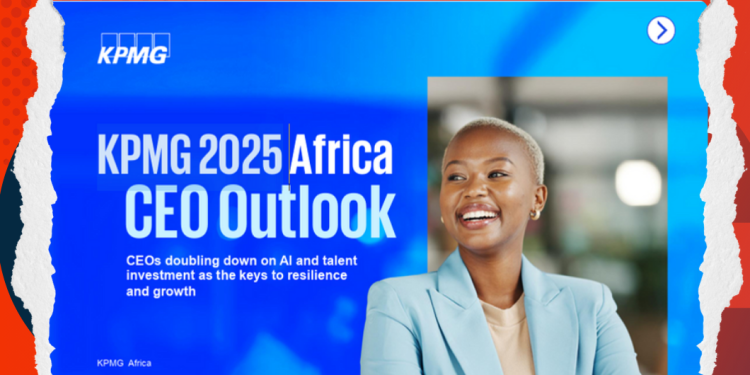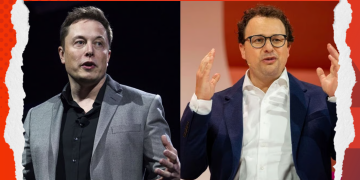Fresh data from KPMG’s 2025 Africa CEO Outlook reveals a striking surge among the continent’s top executives. While global economic uncertainty rattles markets worldwide, African business leaders are doubling down on strategic investments that could transform the continent’s economic future.
KPMG surveyed 130 African CEOs between August and September 2025, uncovering investment patterns that set the continent apart from global trends.
AI Investment Gap Widens Between Africa and Global Markets
African CEOs allocate more than 20% of their annual budgets to AI initiatives; a rate that dwarfs their global counterparts at just 14%. This massive investment gap reveals Africa’s determination to leapfrog traditional development stages through technology adoption.
The survey data shows 61% of African CEOs view AI as essential for organizational growth, treating it not as a future consideration but as an immediate operational necessity. They’re using AI to streamline decision-making processes, boost operational efficiency, and build long-term business resilience.
Meanwhile, 81% of African business leaders believe workforce AI upskilling will directly impact their organization’s success over the next three years. This figure exceeds global confidence levels by four percentage points, highlighting Africa’s focus on human capital development alongside technological advancement.
Economic Confidence Surges Despite Global Headwinds
Business optimism is climbing across Africa’s corporate landscape. CEO confidence in their own companies jumped from 64% in 2024 to 78% in 2025; nearly matching global sentiment at 79%. This shows a 14-percentage-point increase in just one year.
Domestic economic confidence also strengthened, with 63% of African CEOs expressing faith in their home country’s growth prospects, up from 61% the previous year. However, confidence in global economic growth remains cautious at 53%, compared to 68% among CEOs worldwide.
A remarkable 98% of African CEOs expect organizational growth within three years, with 88% planning to increase their workforce. About one-fifth anticipate workforce growth exceeding 6%, while 85% project more modest expansion under 5%.
Merger Activity Accelerates Across the Continent
African CEOs are also embracing aggressive growth strategies through acquisitions. Eighty-six percent plan mergers and acquisitions within the next three years, up from 77% in 2024.
This acquisition appetite reflects strategic thinking about market consolidation and capability building. African companies are seeking to acquire AI expertise, expand their technology infrastructure, and gain competitive advantages through strategic partnerships.
Talent Strategy Shifts Toward Internal Development
African CEOs are taking a different approach to talent acquisition compared to their global peers. While 70% of global CEOs worry about competition for AI talent, only 64% of African business leaders share this concern.
The reason? African companies prefer developing AI capabilities internally rather than competing in external talent markets. A substantial 67% focus on redeploying existing employees into AI-enabled roles, exceeding the global rate of 59%.
This internal focus extends to training programs, with 70% of African CEOs reporting that AI has already influenced their employee development initiatives. However, challenges persist, particularly around succession planning, with 28% expressing concern about upcoming retirements and skilled worker shortages.
Regional differences add complexity to talent strategies. West African CEOs face the steepest challenges in attracting and retaining AI talent at 40%, compared to 30% in East Africa and just 12% in Southern Africa.
Cybersecurity Takes Priority Over Pure Innovation
Investment priorities reveal a pragmatic approach to technology adoption. Cybersecurity and digital resilience top the list at 45% of CEO priorities, followed by AI integration at 41%, and new technology investments at 34%.
This security-first mindset reflects the continent’s recognition that digital transformation must be built on solid foundations. African companies are learning from global cybersecurity incidents and prioritizing protection alongside innovation.
The approach aligns with the infrastructure challenges across the continent, where reliable digital systems remain crucial for sustained business growth.
Environmental Goals Drive Technology Adoption
Sustainability initiatives are gaining momentum among African business leaders, with 78% using AI to reduce emissions and improve energy efficiency. Additionally, 75% report that AI helps improve their environmental data quality and reporting capabilities.
However, implementation varies significantly by region. While 60% of West African CEOs work to align sustainability goals with core business strategies, exceeding both global and continental averages. Only 10% have fully committed to these objectives.
The complexity of supply chain decarbonization presents the biggest challenge, with 21% of African CEOs citing this as their primary barrier to achieving net-zero climate goals. Skills gaps in sustainability implementation compound these difficulties.
Investment Patterns Signal Long-term Thinking
The data reveals African CEOs are thinking beyond short-term gains. Their willingness to allocate substantial resources to AI and talent development suggests confidence in long-term returns rather than quick profits.
This patient capital approach could position African companies advantageously as global markets rely on AI-driven solutions. The continent’s younger workforce demographics also provide a natural advantage for AI adoption and training.
African companies are becoming more strategic about resource allocation, moving away from broad investments toward targeted technology and talent initiatives.
Global Context Highlights African Exceptionalism
The survey results position Africa as an outlier in global business sentiment. While CEO confidence in the global economy has fallen to five-year lows, African leaders maintain robust optimism about their regional prospects.
This divergence suggests African markets may be decoupling from global economic cycles, developing independent growth drivers through technology adoption and human capital investment.
The continent’s AI market is projected to reach $16.5 billion by 2030, starting from $4.5 billion in 2025, representing more than triple growth over five years.
Africa’s corporate leaders are placing bets on their continent’s future, backed by concrete investment commitments and strategic planning. Their willingness to outspend global peers on AI while simultaneously developing internal talent suggests a confidence that could change Africa’s position positively in the global economy over the coming decade.
Download KPMG full Report Here.
















